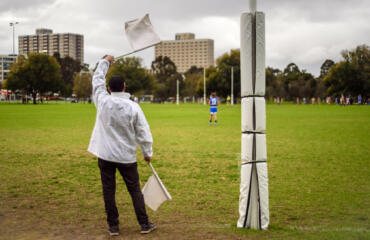
Wimmera farmer David Jochinke: October’s heat wave was a “kick in the guts”. PIC: Stock & Land, Fairfax Media
Standing in a chickpea field on the sprawling plains of Victoria’s Wimmera district, 38-year-old third-generation farmer David Jochinke picks up a clump of dry soil before crushing it into dust, symbolic of an extreme dry spell that has brought back terrible recent memories.
Mr Jochinke, whose 2200-hectare broadacre farm lies just north of Horsham, says he has only seen three good years of rain since taking over in the late 1990s.
This makes him anxious, especially as many farmers in his region are still carrying debt from the so-called Millennium Drought, which gripped the state for more than a decade until 2009, causing widespread crop failures and livestock losses.
The politically active Mr Jochinke, who sits on the board of the National Farmers Federation and lobbies hard for families on the land, says he has revolutionised the way he farms in order to alleviate the effects of drought – in fact, to save his livelihood.
“We’ve tried different crops, we’ve tried different farming systems, we’ve tried different technologies,” he says. “Whether you’re a climate change sceptic or not it doesn’t really matter in my book, because we’ve all changed how we farm to adapt.”
Drought has been an ever-present threat for farmers since European settlement, but now climate experts are cautioning that harsh dry conditions are the new norm, not the exception. Increasingly, farmers are opening to new strategies necessary to protect themselves from this risk while increasing productivity and profitability. Crop diversification, smarter planting, risk information and social media are all playing a role in insulating farmers against the ravages of drought.
Underscoring the message was the hottest October on record, which scorched crops throughout the northwest of the state ahead of this month’s harvest, and led to predictions that the extended dry could slash more than 1 million tonnes from Victoria’s grain harvest.

In response, the State Government announced $30 million in loans for farmers to help cover financial losses, a move welcomed by Victorian Farmers Federation president Peter Tuohey. “A significant proportion of Victoria has fallen within a one-in-10 or one-in-20 year rainfall deficiency, so these loans are extremely timely.”
Mr Jochinke also serves as the vice-president of the non-politically aligned VFF, and recently added his voice to calls for State Government investment in water infrastructure to further bolster parched regions. But the strategies he puts into practice on his own farm at Murra Warra, 30kms north of Horsham, are what farmers can expect to find increasingly necessary in future.
Mr Jochinke says it is hard to determine how much money he has spent — and how much he has saved — as a result of his drought mitigation strategies. It costs him between $400 and $500 per hectare to grow a crop and so losses can compound quickly.

“It is very hard to put a number on it, as our system revolves around water conservation and sustainability,” he says. But the heat wave in October changed everything. “It really has been a kick in the guts. I’ve never experienced anything like this. There’s no way we are even going to get close to breaking even.”
However, the Nuffield Scholar, who graduated dux of the historic Longerenong Agricultural College in 1997, says this year’s losses are unlikely to be as bad as last year due to the measures he has adopted.
With help from a retired farmer and part-time apprentice, Mr Jochinke says he regularly trials new crops to determine whether some varieties fare better in drier conditions.
“Every year, as part of our strategy, we get one tonne of the latest and greatest variety of wheat, barley or even legumes,” he says. “In 2014, we trialled a barley called Compass. It looked so good that I’ve now switched to that for 50 per cent of my barley this year because that variety performed well in my environment.”
Developed by researchers at the University of Adelaide through selective breeding, Compass is a high-yielding variety that suits the drier growing areas throughout Australia.
Agricultural scientist Snow Barlow, of the University of Melbourne, endorses Mr Jochinke’s approach, saying farmers by necessity had to reconsider their operations in a biophysical sense.
“It could be that with more frequent droughts the sort of species that farmers usually grow as part of their production systems may not be the most suitable,” says Professor Barlow, who is a key figure with the Australian Rural Leadership Foundation.
Mr Jochinke has also changed his seeding process and says using a no-till farming method is one of his most effective strategies to avoid loss of soil moisture. No-till farming involves planting new seeds in-between old crops, which reduces erosion and wind damage while allowing the soil to retain moisture.
“Our seeding system is probably one of the biggest revolutions . . . since I started farming,” Mr Jochinke says. “The no-till has been a huge adaptation because it works, and it works because of the moisture conservation.”
“We’ve tried different crops, we’ve tried different farming systems, we’ve tried different technologies. Whether you’re a climate change sceptic or not it doesn’t really matter in my book, because we’ve all changed how we farm to adapt.” — Wimmera farmer David Jochinke
Agricultural scientist Richard Eckard believes farmers must rethink their drought mitigation strategies into the future.
“I think we’ve been on a very long trajectory to do the wrong things about drought, and any good farmer will tell you that it’s the bad farmers who get the payouts from the government,” says Professor Eckard, who heads up the Primary Industries Climate Challenges Centre.
In fact, as Australian farmers grapple with weather volatility, agricultural science and climate science are increasingly intersecting in a research sense.
Professor David Karoly, a leading expert on climate change and climate variability, says that continuing dry conditions are bound to increase crop failure and livestock losses. “The Millennium Drought did not properly end in many regions of the state. In the winter time it just continued to be relatively dry.”
In keeping with David Jochinke’s approach, Professor Karoly suggests that one of the most important things farmers can do is to be prepared, whether that means retaining high reserves of water for irrigation or stores of hay for livestock.
“Farmers need to think about what they can do in dry conditions and that means reducing their stocking and thinking about changing their cropping practices or their grazing practices to reduce the demand.”
Professor Eckard argues that no-till farming, as adopted by Mr Jochinke, needs to become common practice.
“We should be shifting our thinking from the strategy being classed as best practice to it being the minimal expected practice. Best practices are beyond that now,” he says.
“Practices like minimum tillage become that much more important going forward because they are the measures by which we will hold more moisture in the soil for longer and how it will hold more nutrients in the soil for longer.”
“We should be shifting our thinking from the strategy being classed as best practice to it being the minimal expected practice. Best practices are beyond that now.” — agricultural scientist Richard Eckard
But in some instances this may not be enough, and Professor Eckard thinks farmers in dry areas need to take farm diversification more seriously.
“If you’re up in the Wimmera, you’d be looking at diversifying,” he says. “[Then,] if a season came along that wasn’t good you’ve got another form of income. This might be a mixed farming system.
“Diversifying your farming strategy is actually one of the strategies where, if you have crop failure, at least you’ve got the livestock to come in and eat the failed crop to bail you out.”
Professor Eckard says that farmers should stop aspiring for Australia to be the “food bowl of Asia” and instead focus on high-value crops to sell to Asia’s burgeoning middle-class.
“Because of the frequency of drought, we should be switching our mindset towards a value market rather than a volume market. Then, we can cut back on stocking rates and we don’t have to push the boundary as much and make ourselves vulnerable,” he argues.
“In other words, instead of being the Woolworths of Asia, we should be the delicatessen.”
In response to these tough times, Mr Jochinke has started growing specialty crops such as chickpeas and lentils that are exported to India and Sri Lanka.
Information sharing can also be an essential part of how communities fight drought. Mr Jochinke says farmers are using social media to compare their strategies and to determine whether these are effective.
“The number of farmers on Twitter is starting to get to quite a critical mass, so that you can now compare crop photos and compare machinery with somebody from the other side of the world, to talk about an issue that is pretty unique to your circumstances,” he says.
Despite gains being made in the field, Professor Eckard remains critical of farmers’ reliance on government assistance to beat the effects of drought.
“The concept of drought relief is politically good but economically bad, because what you end up doing is subsidising the less-efficient farmers,” he says, adding that those farmers hardest hit should accept structural adjustment packages.
“In other words, a farmer meets with a consultant to come up with a business plan on how they are going to re-adjust their farming system viably to cope with the drought, and to cope with drought in the future. Then, if drought reoccurs we fund the business plan, not just a handout.”
Professor Barlow also stresses the importance of planning before hard times hit.
“I think the key point about mitigating drought in Australia is that it’s about risk management rather than disaster management,” he says. “There have been some very successful pilot projects in Western Australia where farmers were basically given business management training, which was a lot about financial risk management and it proved very successful for them to essentially prepare for drought in the business sense.”


